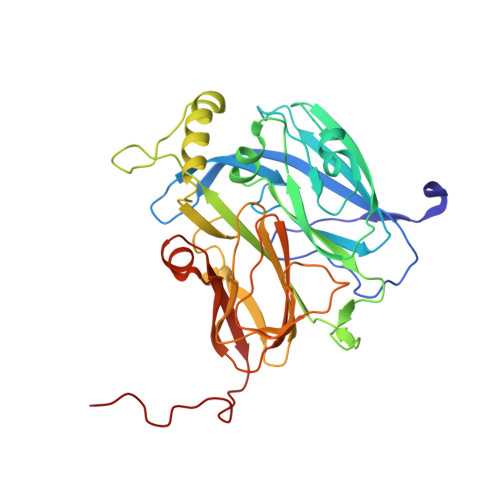Serial crystallography captures enzyme catalysis in copper nitrite reductase at atomic resolution from one crystal.
Horrell, S., Antonyuk, S.V., Eady, R.R., Hasnain, S.S., Hough, M.A., Strange, R.W.(2016) IUCrJ 3: 271-281
- PubMed: 27437114
- DOI: https://doi.org/10.1107/S205225251600823X
- Primary Citation of Related Structures:
5I6K, 5I6L, 5I6M, 5I6N, 5I6O, 5I6P - PubMed Abstract:
Relating individual protein crystal structures to an enzyme mechanism remains a major and challenging goal for structural biology. Serial crystallography using multiple crystals has recently been reported in both synchrotron-radiation and X-ray free-electron laser experiments. In this work, serial crystallography was used to obtain multiple structures serially from one crystal (MSOX) to study in crystallo enzyme catalysis. Rapid, shutterless X-ray detector technology on a synchrotron MX beamline was exploited to perform low-dose serial crystallography on a single copper nitrite reductase crystal, which survived long enough for 45 consecutive 100 K X-ray structures to be collected at 1.07-1.62 Å resolution, all sampled from the same crystal volume. This serial crystallography approach revealed the gradual conversion of the substrate bound at the catalytic type 2 Cu centre from nitrite to nitric oxide, following reduction of the type 1 Cu electron-transfer centre by X-ray-generated solvated electrons. Significant, well defined structural rearrangements in the active site are evident in the series as the enzyme moves through its catalytic cycle, namely nitrite reduction, which is a vital step in the global denitrification process. It is proposed that such a serial crystallography approach is widely applicable for studying any redox or electron-driven enzyme reactions from a single protein crystal. It can provide a 'catalytic reaction movie' highlighting the structural changes that occur during enzyme catalysis. The anticipated developments in the automation of data analysis and modelling are likely to allow seamless and near-real-time analysis of such data on-site at some of the powerful synchrotron crystallographic beamlines.
Organizational Affiliation:
School of Biological Sciences, University of Essex , Wivenhoe Park, Colchester CO4 3SQ, England.

















